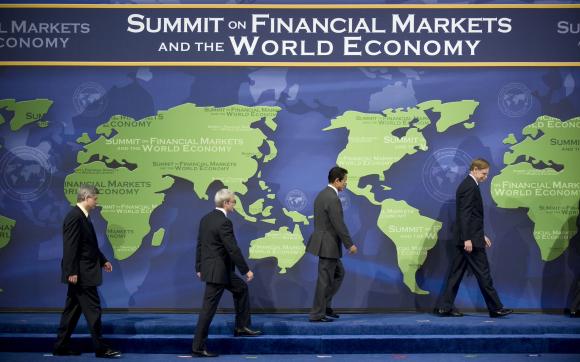Specifically, trade is experiencing a sudden, severe and globally synchronised collapse. This freefall is one of the main channels through which the G7 recession is dragging down growth in other G20 nations.
It is true that G7 financial rescue and macro stimulus efforts must be the heart of the world’s crisis response, and financial regulatory reform is necessary to avoid future crises. But many G20 nations – perhaps a majority – are bystanders in discussions of massive stimulus packages and fundamental reform of the world’s most sophisticated financial practices. Trade, by contrast, concerns all G20 nations.
Our recent book concludes that protection is not yet a cause of trade’s plunge. It would, however, be irresponsible not to recognize that the mercantilist spectre is knocking at everybody’s door, that recession will embolden protectionist forces inside every G20 member. A perverse feedback between recession and protectionism is no longer an historical reminiscence of the 1930s but a possible scenario today. Hopefully it is a low probability scenario, but it is clearly one that G20 leaders could rule out with forceful action at the London Summit.
A protection-recession spiral is one of the few things that have not yet gone wrong in this crisis. The G20 should try, for once, to get out in front of the crisis and take concrete steps to ensure the spiral never gets started.
In our book, trade experts from around the world provide a list of such steps. These include a commitment to a more specific and broader standstill on new protection backed up by a real-time surveillance mechanism, a pre-commitment to negotiating the removal of all crisis-linked measures in three years’ time, and a head-of-state negotiation of a compromise that would get the Doha talks back on track. The boldest proposal, by former Mexican President Ernesto Zedillo, will not please diplomats as it suggests keeping the peace by preparing for war. He suggests that countries pledge to use whatever legal means they have at their disposal to retaliate against others for protectionist actions that harm their exports. ‘All you need,’ he writes, ‘is one major trade partner to commit to retaliation for others to follow suit … We need tough love, not sweet words in our present circumstances.’
Time is of the essence. A protectionist spiral in next nine months would be a tragedy – aborting any hope that the stimulus packages will work as well as killing any hopes that cooperation on the economic crisis can set the stage for cooperation on climate change.
This simple truth seems to have escaped the attention it deserves – perhaps because the G20 process is guided by Finance Ministries and Central Banks. Whatever the reason, it is odd that the emerging-economy members of the G20 have not insisted on a higher profile for trade issues that affect them much more immediately than agenda items such as financial reform or long drawn-out efforts to adjust ‘shares and chairs’ at the IMF, World Bank and other international financial institutions. It is time that emerging economy members of the G20 band together and demand that G20 action on trade should be at the top of the London Summit’s agenda.
Richard Baldwin is Professor of Economics at the Graduate Institute, Geneva, and Founder and Editor-in-Chief of CEPR’s Policy Portal VoxEU.org. This blog is based on the Vox Ebook he co-edited with Simon Evenett, ‘The collapse of global trade, murky protectionism and the crisis: Recommendations for the G20‘.


I strongly feel that we are heading for more and more troubles in the area of trade, finance, banking etc just because the G7 countries are not iterested in creating any worthwhile institution for permanenet reforms for global welfare; to us, G7 as also G 20 have notional value only as a meeting group and hence cannot provide any new mandate as well. Moreover, they donot have vision of Prof JM Keynes, Sir Hans Singer and mr White who helped in the cretion of IMF and World Bank; but Keynes’ vision to make the WB as Central Bank couldnot materialise due to opposition of mr White;
NOw the protectionist wave is again coming up from the developed west due to petty antional interests and also unending financial and banking troubels ( all these due to gross minmanagement in the US and Western countries , wasteful expenditure soaring higher and higher for years indeed
Now in new century, seems free trade is breaking out all over; Several coutnries on the way to conclude FTA with neighbours-Europe, Japan, US, Australia and many more ;
we find two opposite tends all over: one is towards managed trade( since now about 70 p.c. of trade flows all over ar e managed with several subtle measures; second is more and more globalisation of production by giant MNCs. Realy neither trend can be analysed in economic terms due to interplay of political factors and veted interests.